The biggest stadiums in the world in 2025 are impressive huge stadiums. Originally, most of these amazing stadiums were more humble than how they are presently. Most have been built close to 100 years ago or above.
However, over the years, they undergo renovations, that bring these stadiums to their current seating capacity. In fact, these stadiums can accommodate more than their official seating capacity.
These are the top 15 world's biggest stadiums in 2025, they are,
- Rungrado 1st of May Stadium
- Narendra Modi Stadium
- Michigan Stadium
- Beaver Stadium
- Ohio Stadium
- Kyle Field
- Neyland Stadium
- Tiger Stadium
- Darrell K Royal-Texas Memorial Stadium
- Bryant–Denny Stadium
- Melbourne Cricket Ground (MCG)
- Camp Nou
- First National Bank Stadium (FNB Stadium)
- Sanford Stadium
- Cotton Bowl Stadium
Check out these huge stadiums, their pictures, official seat capacity, locations, date opened, and lots more.
Please read on...
1. Rungrado 1st of May Stadium
 |
| Image credit: Nico |
Seat capacity: 114,000
Sport: Multi-purpose
Area covered: 200,000 sqm (20.7 hectares, 51 acres)
Overall Height: 60 meters
Cost: USD $210 million:
Location: Pyongyang, North Korea
Year opened: 1989
Renovation: 2014
The stadium looks like a parachute and it symbolizes a magnolia flower. The highest attendant recorded was in 1995, in which the stadium occupy 190,000 people. The stadium was actually set to occupy 150,000.
Even at the capacity mentioned above, it is still the largest stadium in the world in 2025. It was built in response to the disagreement over Seoul’s Olympic Stadium between North and South Korea.
The construction of the building takes about 2.5 years. It has other facilities such as indoor halls, swimming pools, and running tracks. Although it is big, it has not been used for large football as well as some athletic events.
2. Narendra Modi Stadium
 |
| Image credit: Splco.me |
Seat capacity: 110,000
Sports activities: Cricket
Area covered: 63 acres
Overall Height: 9 meters
Location: Ahmedabad, India
Year opened: 1983
Renovation: 2020
Cost: US$110 million
It is the second among the largest stadiums in the world in 2025 with its seating capacity according to Populous firm that designed the stadium and Guinness World Record.
It was formerly known as Motera Cricket Stadium. Its former structure was demolished and redesigned between the years 2017 and 2020. Its design is like a large bowl with two big seating tiers.
Each of the tiered spaces is capable of accommodating 50,000 people. Even though it is basically built for cricket, other sports activities can be carried out in it, such as lawn tennis, basketball, hockey, and football.
3. Michigan Stadium
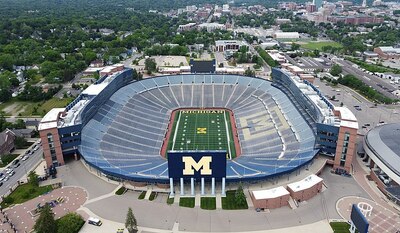 |
| Image credit: Lectrician2 |
Seat capacity: 107,601
Sports activities: Football
Area covered: 16 acres
Overall Height: 82 feet
Cost: $950,000 (in 1926), $226 million (2010)
Location: University of Michigan, South State Street, United States
Date opened: October 1, 1928
Renovation: 2010
It is also referred to as the Big house due to its huge size have been built in the 1980s. Even though from the outside, it seems small until you get inside, then you see that it is huge.
Since the time it was built in 1927, this stadium has always been listed among the top largest stadiums in the world. At the start, when it was inaugurated, the stadium can only accommodate 84,400.
In 2013, there was a record of 115,109 people in attendance. Although it was nicely designed, one crane got sink inside the quicksand, under the field, this is because there is an underground running spring under the stadium.
In the United States, it is the largest college football stadium. The first game played in the stadium, that is the day it was opened, the game was between Ohio Wesleyan and Michigan. In the game, Michigan defeated Ohio Wesleyan 33-0.
4. Beaver Stadium
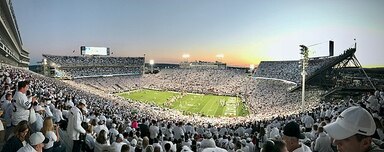 |
| Image credit: StateLionPro |
Seat capacity: 106,572
Sport: Football
Surface: Natural grass
Cost: $93 million (for the expansion in 2001)
Location: Pennsylvania State University, Pennsylvania, United States
Date opened: September 17, 1960
Renovation: 2001, 2008 & 2014
When it was opened, the stadium can only accommodate 46,284. The stadium has been expanded and renovated up to six times from the time it was built.
The seating capacity increased from 93,967 in 1991 to 107,282 in 2001. Because of people with disabilities, it was reduced to the capacity mentioned above in 2011.
On September 29, 2018, it was the highest number of people recorded, there was a game between Ohio State and Penn State in which people in attendance was 110,889.
5. Ohio Stadium
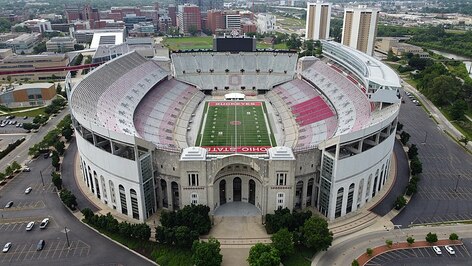 |
| Image credit: Lectrician2 |
Seat capacity: 102,780
Sport: American Football
Area covered: 14.5 acres
Surface: Fieldturf
Cost: $1.34 million (in 1921)
Location: Columbus, Ohio, United States
Date opened: October 7, 1922
Renovation: 2014
The stadium has the shape of a horseshoe, and for this, it is known as "the Horseshoe", "the Shoe", as well as "the House That Harley Built".
In 1999, it can only occupy 91,470 spectators, but the capacity continues to increase over the years and now it has the capacity mentioned above in 2019. The stadium is owned by Ohio State University.
It has the highest record on November 26, 2016, with spectators of 110,045 in attendance that watch Ohio vs. Michigan. This stadium is one of the largest stadiums as well as it is the largest poured concrete building in the world.
6. Kyle Field
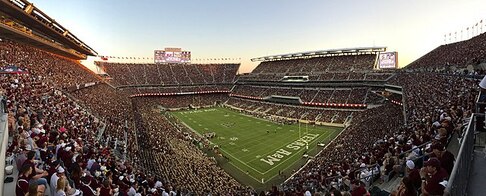 |
| Image credit: Janreagan at English Wikipedia |
Seat capacity: 102,733
Sport: American football
Surface: Latitude 36 Bermudagrass
Cost: $650 (in 1927), $365,000 (1929), $425 million (2015)
Location: Houston Street, College Station, Texas, United States
Date opened: September 24, 1927
Renovation: 2015
The stadium is named after the man that built it, Edwin Jackson Kyle. He was given the land where the stadium is today for agricultural purposes since he graduated from the horticulture department in 1899.
Instead, he fenced the land and use it for an athletics field for the students. The original capacity was for 500 people at the time he built it, then the first concrete building in the stadium was built in 1929 for 32,890 spectators.
And the seating capacity continues to increase to the latest capacity in 2015. It has its highest record attendance in 2014, there were 110,633 people in the stadium that watch the Ole Miss Rebels vs Texas A&M.
7. Neyland Stadium
 |
| Image credit: Neomrbungle |
Seat capacity: 102,455
Sport: Football & multi-purpose
Surface: Grass
Cost: 136.4 million (2010)
Location: Knoxville, Tennessee, United States
Date opened: September 24, 1921
Renovation: 2004 to 2010
The stadium location is fascinating, as it is located south of downtown Knoxville, Tennessee, on the bank of the Tennessee River. The stadium was formerly known as Shields–Watkins Field but was renamed its present name in 1962.
The stadium was named in honor of a legendary coach, Robert Reese Neyland (1892-1962). From the year it was built, till today, the stadium has undergone 16 expansions.
On September 18, 2004, the stadium recorded its highest attendance which was 109,061 people watching Florida vs Tennessee.
8. Tiger Stadium
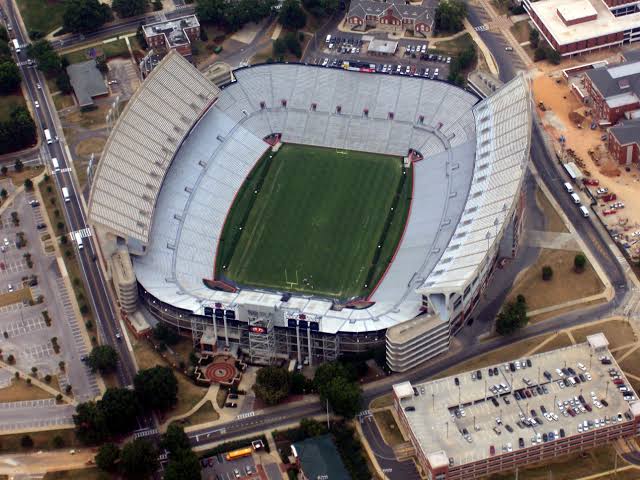 |
| Image credit: AuburnPilot |
Seat capacity: 102,321
Sport: Football
Area covered: 3 hectares
Surface: Grass
Cost: $300,000 (1912), $60 Million (expansions)
Location: Trumbull Avenue, Detroit, Michigan, United States
Date opened: November 25, 1924
Renovation: 2009
It was formerly known as Briggs Stadium and Navin Field. It is also referred to as "The Corner", because of its location which is the intersection of Trumbull Avenues and Michigan.
It is also regarded as the State of Michigan Historic Site. It is one of the top largest stadiums. The first structure of the stadium was able to accommodate 24,000 spectators.
In order to enhance the design of the stadium and expanded, it was closed in June 2001. Then the former building was demolished in 2008 and it was completed in 2009.
9. Darrell K Royal-Texas Memorial Stadium
 |
| Image credit: Brint03 |
Seat capacity: 100,119
Sport: Football, Track, and field
Overall Height: 67.97 meters
Cost: $125,000 (In 1926), $200 Million (on expansions)
Surface: FieldTurf
Location: Austin, Texas, United States
Date opened: November 27, 1924
Renovation: 2021
It is also referred to as DKR, War Memorial Stadium, or simply Texas Memorial Stadium. The stadium was dedicated to a legendary football coach, Darrell Royal (1924-2012), and War Veterans.
It is the 9th largest stadium in the world and 8th among the biggest in the US. It is located near downtown Austin. The stadium belongs to the University of Texas System. When it was built, it has a horseshoe shape that accommodate only 13,500 people then.
The current seating capacity was realized in 2009 and the most recent renovation was done the last year 2021. The stadium has a scoreboard that is 7,370 sq. feet (685 sq. meters) in area. It is the world's largest HD video screen.
10. Bryant–Denny Stadium
 |
| Image credit: Latics |
Seat capacity: 100,077
Sport: Football
Area covered:-
Surface: Grass
Cost: $196,000 (1929), $107 million (2019 renovation)
Location: Paul W Bryant Drive, Tuscaloosa, Alabama, United States
Date opened: September 28, 1929
Renovation: 2019
The enormous stadium is situated within the campus of the University of Alabama. It was named after George H. Denny, the president of the University at that time.
The highest number of attendance was on October 16, 2010, with a spectator of 101,821 attendance. Since the date it was opened which is more than 93 years ago, it has been expanded multiple times.
The original structure of the building was just the lower tier of the eastern stand. It is certainly, one of the largest stadiums in the world today.
11. Melbourne Cricket Ground (MCG)
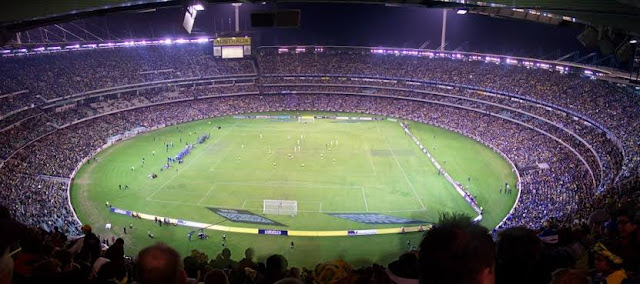 |
| Image credit: Charles Gregory (en:User:Chuq) |
Seat capacity: 100,024
Sport: Football, Cricket, and other events
Cost: $465 million (2006), $55 million (2012)
Surface: Grass
Location: East Melbourne, Victoria, Australia
Year opened: 1853
Renovation: 2006 (major), 2012
We have left the US and we are now in Australia. It is the biggest sports stadium in Australia and of course one of the top largest stadiums in the world.
This huge stadium is rich in history as it was opened 169 years ago, that is a very long time ago and since then, it has undergone many renovations. The stadium is recognized for its role in international cricket development.
In 1877 and 1971, the MCG hosted the inaugural Test and One Day International cricket matches between Australia and England. The highest record of attendance of 121,696 of the stadium experience was in 1970, which was the VFL Grand Final between Collingwood and Carlton.
12. Camp Nou
 |
| Image credit: Mark Freeman |
Seat capacity: 99,354
Sport: Football
Area covered: 55,000 sqm
Overall Height: 48 meters
Surface: GrassMaster hybrid grass
Cost: $310 million
Location: Barcelona, Catalonia, Spain
Date opened: 24 September 1957
Renovation: 2018
The stadium was designed and constructed by architects Josep Soteras Mauri and Francesc Mitjans Miró. The construction of the stadium is mainly Iron and concrete.
It is the biggest stadium in Europe and undeniably, on the list of the largest stadiums in the world as well. By July 2022, the stadium will be renamed Spotify Camp Nou. Another renovation of the stadium may start by June 2022.
Although, due to various adjustments, the total capacity has fluctuated over time. When it was opened, it could only accommodate roughly 92,053 people, then it was increased in 1982 to around 120 seating capacity and then in the 1990s reduced back to nearly 99,000.
13. First National Bank Stadium (FNB Stadium)
 |
| Image credit: EUROLUFTSBILD.DE /Reuters Via Fandom.com |
Sport: Football
Area covered: 24 hectares
Surface: Grass
Cost: $440 million
Location: Stadium Avenue, Nasrec, Johannesburg, South Africa
Year opened: 1989
Renovation: 2009
It is also referred to as the Calabash due to its design, if you look at its aerial view or from the inside, it looks like a calabash ( a traditional African pot or bowl).
The exterior cladding is a fire and clay color mix, with a ring of lights flowing around the bottom of the building, mimicking fire beneath the pot.
It is also known as the Soccer City, which is among the biggest stadiums in the world and the largest in Africa. It is one of the landmarks in South Africa. The stadium is well designed and no matter where you are in the stadium, you are going to have unobstructed views.
14. Sanford Stadium
 |
| Image credit: Ugadawgs12 |
Seat capacity: 92,746
Sport: Football
Area covered: -
Surface: Tifton 419 Bermuda Grass (Natural grass)
Cost: $34 Million (expansions)
Location: Sanford Dr and Field St, Athens, Georgia, United States
Date opened: October 12, 1929
Renovation: 2018
Dooley Field at Sanford Stadium is the stadium's full name. It was named after, Dr. Steadman Vincent Sanford. He was the athletics committee faculty representative and he later became the University System of Georgia Chancellor.
It is one of the electrifying arenas for college football and certainly one of the largest stadiums in the world. The major renovation in 2018 includes the establishment of a team locker room, a plaza for supporters, and an area to host prospective student-athletes.
Since the time it was built, the stadium has experienced different expansions, however, that 2003 expansion bring the stadium to the seating capacity it has today.
15. Cotton Bowl Stadium
 |
| Image credit: Robbiewest88 |
Seat capacity: 92,100
Sport: Football, large music concerts & similar activities
Surface: Natural grass
Cost: $328,200 (in 1930, about $5.5 million today), $50 million (2008 renovation)
Location: Dallas, Texas, United States
Year opened: 1930
Renovation: 2008
The stadium has an amazing look at night. It was previously known as Fair Park Stadium in the 1930s which was a wooden stadium then.
It was named the Cotton Bowl Classic, which is a yearly college football post-season bowl game that was launched in 1936 officially.
It is one of the iconic stadiums in the US and certainly the 15th out of the largest stadiums in the world. Nonetheless, the game which the stadium was named after, bowl games are no longer played at the stadium.
Over to you, what do you think about the biggest stadiums in the world in 2025? We will like to know your view in the comments section below (Post a comment). Please share this article, we appreciate that, and then you can follow us at our social media handles or you can subscribe to our mailing list (we do not spam). Thanks for reading!


Nice post. I always enjoy reading your posts
ReplyDeleteThanks for the clarification on the first and second biggest stadiums.
ReplyDeleteI am glad that the post was helpful.
DeletePost a Comment